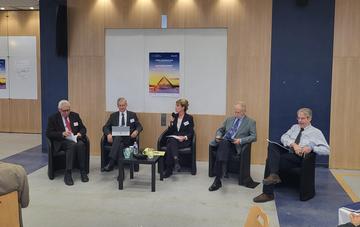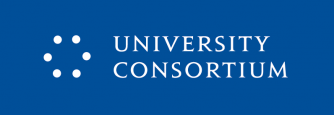UC Annual Conference 2023: Reflections on the Keynote Panel Discussion
Cyrus Newlin
Peace appeared a distant prospect at the closing panel of this year’s University Consortium conference, symmetrically titled “Effects of the War on the Evolution of the International System and the International System's Effects on the Evolution of the War.” An august group of scholars and practitioners from the UK, US, and France addressed both sides of the prompt—but discussion was weighted towards the war’s impact on the international system, whereas the precise character of that system today and its bearing on an evolving, multi-phased conflict proved far more difficult to assess. This response will recapitulate major themes of the panel into two groupings—the political and security impacts of the war for the international system—and offer several personal reactions.
Effect on Politics
One question resurfaced frequently over two days of dialogue: is the Cold War an appropriate analogy for the international system today? Some attendees saw good evidence for this in a reemerging bipolarity: on one side, the global West, defined to include the G7 plus South Korea and Australia, which maintain strong stakes in a liberal international order that advances its state interests; on the other, the Axis of Disrupters or ‘East,’ united by a joint anti-Western posture, led by a tightening China-Russia pairing and abetted by North Korea and Iran, and increasingly animated by measures designed to subvert that order.
Our panelists were circumspect. They acknowledged growing polarization but not clearly bipolarization, and noted that China and Russia continue to benefit from the liberal international system—China economically, as the top trade partner to more than 120 countries, and Russia politically, as a self-styled foil to the West whose domestic and international appeal turns in great part on a revisionist, anti-system politics.
Like our panelists, I see a messier system emerging defined by a growing preference for non-alignment more than the solidification of discreet blocs with common ideological and political traits. Of course, there are echoes of the Cold War in US-China technology competition or in Moscow and Beijing’s sharp authoritarian turn—and the analogy would strengthen if countries began to ally with or against the West. But for now, I see more evidence of the opposite: fence-sitting, a rejection of moralism of any political variety, and the pursuit of multi-vector strategies designed to enhance state clout by way of shifting, purpose-built relationships. It is a world in which India can elevate its role within the BRICS while also joining a US-aligned security Quad, in which Saudi Arabia can flex its US-enabled military prowess while also expanding economic linkages with China, or Brazil can host Sergei Lavrov and John Kerry within the same 30-day period.

Indeed, the primacy of pragmatic realism throughout the Global South was a second major theme of the conference. (By “Global South” I refer to the non-West minus China, Russia, North Korea, and Iran, understanding the grouping encompasses diverse actors and interests). While the war has provoked a rare unity of purpose among Western democracies, elsewhere it has highlighted ambivalence towards a perceived “European problem” and a willingness to capitalize on opportunities presented by war, from Delhi’s purchases of discounted Russian oil to Turkey’s maneuvering as a Black Sea power broker, at once profiting from arms sales to Kyiv while negotiating a grain corridor with Moscow. Of note, too, are the 39 countries that abstained from or rejected a UN resolution calling on Russia to leave Ukrainian territory a year into the war—a reminder of Russia’s enduring appeal as an energy and security partner as well as a hedge against the West even in regions most exposed to the war’s inflationary effects.
There are structural implications to the Global South’s response. Panelists agreed that Russia’s norm-shattering invasion is both a symptom and accelerant of an evolving world order but not its underlying cause. Are we in a new, multipolar reality? Does the Global South constitute a sort of “third pole”, or is it in fact compatible with a bipolar interpretation of the international system given that the US and China remain far ahead by most metrics of state power? The consensus seemed to be that the international system is growing more fragmented and less ideological.
From these questions flow policy implications, which were somewhat underdiscussed. That the Global South perceives selective Western indignation is well known. One panelist made the point succinctly by citing Indian external affairs minister S. Jaishanker: “Europe has to grow out of the mindset that its problems are the world’s problems, but the world’s problems are not Europe’s problems.” Still, on what basis might the West establish its appeal to the South? How might the West articulate a more inclusive vision of a rules-based liberal order? Which liberal institutions are working well for developing countries, and which are in need of reform? Therein lies a ripe agenda for future University Consortium dialogue. Given the growing centrality of these questions for European security, the Consortium must continue to prioritize the inclusion of perspectives that challenge transatlantic consensus—what for me was a highlight of the conference.
A stronger appeal for a rules-based order might begin with a better articulation of how that order serves non-Western interests. Unfortunately, the case is becoming harder to make for two reasons. First, the multilateral institutions at the core of the liberal order appear not to be functioning well, a trend exacerbated but not caused by Russia’s invasion. Paralysis inflicts the UN and WTO, and there is a thin agenda at regional bodies such as the OSCE and Arctic Council. Liberal institutions can be places to hold Russia to account, but they must also be places where more of the Global South feels their interests are represented, if not always reflected in final outcomes. Second, key Western powers are themselves turning away from liberal institutions at the center of a rules-based order. The US, the country that has done the most to shape global trade rules, appears increasingly willing to flout them. However well-intentioned the subsidies and domestic content provisions of new US climate legislation, these policies feed a perception that the wealthiest nations only follow the rules of global trade when it serves their interests, reducing the South’s buy-in in a rules-based order.
The irony is that by focusing Western attention onto economic and supply chain security, Russia’s invasion is expediting the West’s movement away from the liberal economic institutions that defined the post-Cold War era. Similarly, the West’s unprecedented use of economic sanctions against Russia is expediting the search for alternatives to the US dollar—however nascent now—for trade invoicing and foreign exchange reserves. Policymakers in Washington and Brussels should recognize this tension and, lest the liberal economic order atrophy beyond recognition, signal their continued support for free trade agreements with countries that do not pose clear security risks.
Effects on Security
It bears repeating that Russia’s violation of the cardinal rule of the post-World War II international order—no territorial change by military force—has made the world less secure. Ground zero for that insecurity is Europe, but panelists made clear that its reverberations extend well beyond.
In the immediate term, Russia’s invasion has heightened tensions directly, as a coalition of NATO member states arm Ukraine and Russian troops operate in much closer proximity to NATO along an expanded border, and indirectly, as arm control agreements elapse and diplomatic contact tapers off.
Certain changes to European security will unfold over many years: in Germany, Zeitenwende, an epochal shift in defense policy backed by a €100 billion defense budget allocation and a renewed pledge to meet NATO’s two-percent spending requirement; in France, a hardening security posture and the abandonment of any unilateral overtures to Russia; in Poland, an upgraded role in European defense now coinciding with a new, pro-Europe political orientation.

For its part, Russia has reordered its economy and industry to serve war aims in ways not quickly reversible. Foreign companies have fled en masse, while state subsidies and investments have crowded out private sector activity. Russia’s wartime Keynesianism is fiscally unsustainable over the long term, but the Kremlin and many Russian elites are better served now by kicking the can down the road than by addressing growing fiscal imbalances, meaning there will remain economic stakes in a militarized foreign policy for the foreseeable future. Even in the event of a ceasefire or, less likely still, a political settlement, Russia will loom as, and perceive in Europe, an elevated long-term threat.
These shifts will exert a powerful force on European security regardless on the war’s outcome. The University Consortium therefore has an important role to play in anticipating and preparing for the security environment that Europe will inherit after the conflict’s current phase, especially as US and European policymakers remain squarely focused, for now, on the complex task of generating and sustaining aid to Ukraine.
Panelists noted effects beyond mainland Europe. An elevated risk of accidental NATO-Russia escalation in the Arctic or eastern Mediterranean coincides with the abandonment by Russia of arms control agreements. Russia’s invasion has also engendered new forms of defense alignment, with Moscow sourcing drones from Iran and artillery shells from North Korea and Ukraine receiving large shipments of munitions from a typically cautious South Korea.
China loomed large throughout the conference. Now more economically and politically dependent on Beijing than ever, Russia’s ability to exert control over the relationship—for example, by limiting Chinese involvement in the Arctic, what for Russia has long been a sensitive region—is diminishing. Rather than distract from the China challenge, Russia’s invasion and China’s tacit support has focused attention onto what steps Beijing may take to change the status quo in Taiwan. In this sense, Russia’s war has been one factor animating new, US-led security groupings in AUKUS and the Quad.
Finally, the war redefined the meaning of security. Economic security and energy security are top of mind for US and European policymakers—but also across the Middle East, Africa, East Asia. Alongside Russia, China has been on the receiving end of a growing number of export controls. Russia’s invasion and the West’s responses has injected new urgency into China’s drive for self-sufficiency.
Conclusion
It has become cliché to observe that the US must “get its own house in order” to contribute meaningfully to global democracy and security. That conception is inward looking, with progress abroad captive to progress at home. A better cliché, perhaps—and one informed by two days of dialogue at the University Consortium—is that the West must “get its own institutions in order” to give its vision staying power in the face of emboldened challengers. The first step is to expand buy-in to the liberal order by making it work better for the non-West. But in responding to Russian aggression, the West must also avoid subverting and diluting that order from within—what would make even victory in Ukraine a pyrrhic one.



